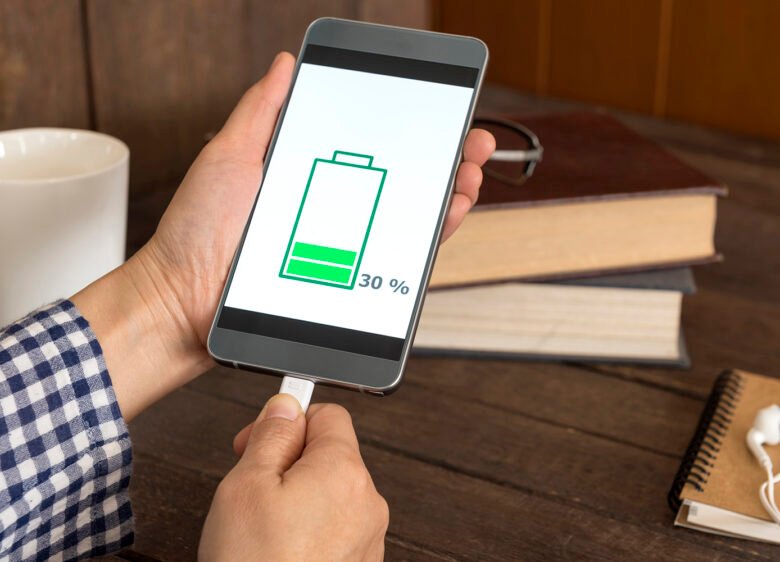In today’s fast-paced digital world, smartphones are more than just tools; they are our daily companions, keeping us connected, informed, and entertained. Our busy lives depend on batteries, which we find in smartphones, laptops, tablets, and even wearables. However, a common consumer complaint is that these batteries don’t last long, especially because they drain faster over time. The good news is that by taking good care of your battery and using it correctly, you can extend the life of your device without having to worry about constant charging.
How Batteries Work
To extend the life of your device’s battery, you first need to understand how batteries work. Most modern products use lithium-ion batteries, which have a fixed lifespan and require a certain number of charge cycles. A charge cycle is completed when the battery goes from fully charged to empty and back to full again. These cycles gradually reduce the battery’s capacity, meaning it gradually decreases. By understanding how batteries work and what factors can damage them, you can better maintain them and extend their lifespan.
Avoiding Extreme Temperatures
Cold and heat are two of the most damaging factors for batteries. Leaving electronic devices in direct sunlight, near heaters, or in cold weather can cause the battery to charge less efficiently and shorten its lifespan. Overheating is particularly damaging to batteries and the internal components of smartphones. Try to use these electronic devices in environments that are neither too hot nor too cold and store them in a cool, dry place to protect the battery. Don’t charge your phone in a hot car or in direct sunlight, as these conditions can permanently damage the battery.
Charge Wisely and Carefully
The way you charge your device significantly impacts its lifespan. Many people think you should wait until the battery is empty before charging it, but this isn’t good for lithium-ion batteries. To keep the battery in good condition, it’s best to keep your device’s charge between 20% and 80%. Frequently charging your phone overnight can also shorten its battery life, as it stays at 100% for extended periods. Using the original charger or a high-quality replacement charger is also crucial to prevent battery damage from infrequent charging.
Reduce Background Activity
Multitasking can drain your battery faster. Apps and programs running in the background can drain your battery, even when you’re not using them. You can extend your battery life by closing unnecessary programs, disabling automatic updates while you’re using them, and managing background activity. Many devices also have power-saving modes that automatically reduce background activity and adjust settings to optimize their performance. Using these features regularly will reduce the drain on your battery.
Change Screen Brightness and Settings
Every device’s screen uses a lot of power. Constantly leaving the screen at maximum brightness will quickly drain your battery. Instead, adjusting the brightness to a comfortable setting or enabling auto-brightness can make a big difference. Other ways to save battery life include reducing screen idle time, disabling vibration when not needed, and disabling location services when not needed. Small, daily adjustments to how you use your phone can significantly improve battery life.
Keep your Software Up to Date
Software updates add new features and include improvements that help with power management. If the software version is too old, apps may consume too much power or contain bugs that can cause your battery to drain faster. Keeping your device’s operating system and apps up to date helps keep your battery in top condition. You can ensure your smartphone always has the best software by letting it update itself or manually checking for updates. This extends battery life.
Using Battery-Saving Features
Most devices today have built-in power-saving modes. These features extend battery life by adjusting battery efficiency, reducing background activity, and limiting power-intensive tasks. Enabling these modes can disable certain features, such as push notifications or visual effects, but they’re especially effective at ensuring your smartphone lasts longer when you need it most. Making a habit of enabling power-saving features when the battery is low will help you get the most out of every charge.
How to Store Your Device
If you plan to leave your device unused for an extended period, how you store it is crucial for battery health. Storing your device with a fully charged or fully discharged battery can reduce its ability to hold a charge. Experts recommend letting the battery drain to about 50% before storing it. This ensures the battery is healthy and can retain a good charge when you use it again.
Use your device carefully.
How you use your device daily directly impacts its battery life. Playing demanding games, using multiple apps simultaneously, and keeping it connected to the internet can all drain the battery. By using your device wisely—for example, giving it a break, turning off Bluetooth or Wi-Fi when you don’t need them, and avoiding too many tasks simultaneously—you can extend your battery life. By understanding your device’s capabilities and limitations and using them correctly, you can make your battery run more smoothly and last longer.
Conclusion
You don’t have to do complicated things or buy expensive equipment to extend your device’s battery life. You can maximize battery performance by charging it properly, avoiding high temperatures, regulating background activity, and using built-in energy-saving technologies. Proper maintenance of your devices not only improves their daily performance but also prevents you from having to buy new devices or replace batteries (which can be expensive). If you take excellent care of your phone, computer, and tablet and use them correctly, they will last for years without needing constant charging.
FAQs
1. Why does my battery drain so quickly?
High screen brightness, apps running in the background, outdated software, and frequent use can all contribute to faster battery life. Changing these settings can help save energy.
2. Can I charge my smartphone overnight?
Regularly leaving your device plugged in overnight can harm your battery health, as it stays at 100% charge for longer than necessary.
3. What is the optimal charge range for longer battery life?
The best way to maintain a healthy battery and minimize excessive wear and tear is to keep the battery charge between 20% and 80%.
4. Is using battery saver mode harmful to my device?
No, battery saver settings are designed to extend battery life by reducing background activity and power-intensive functions without damaging the device.
5. How can I protect my device if I don’t use it for several months?
To protect your device during storage, keep the battery charge around 50% and store it in a cool, dry place.




